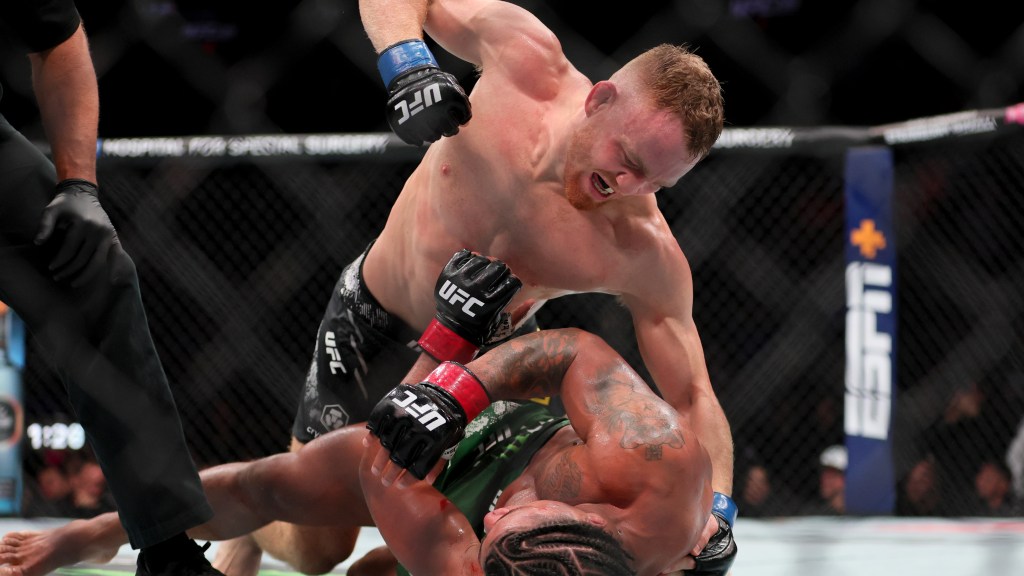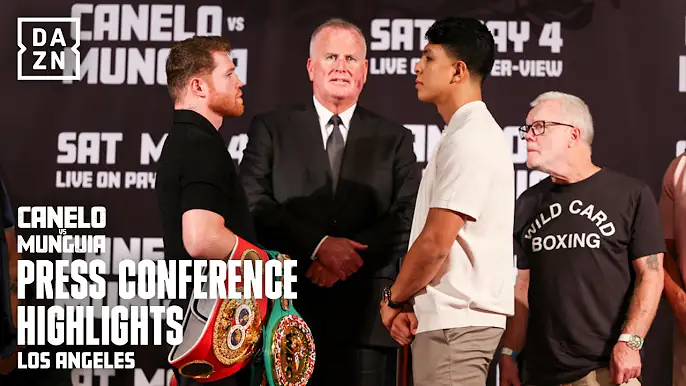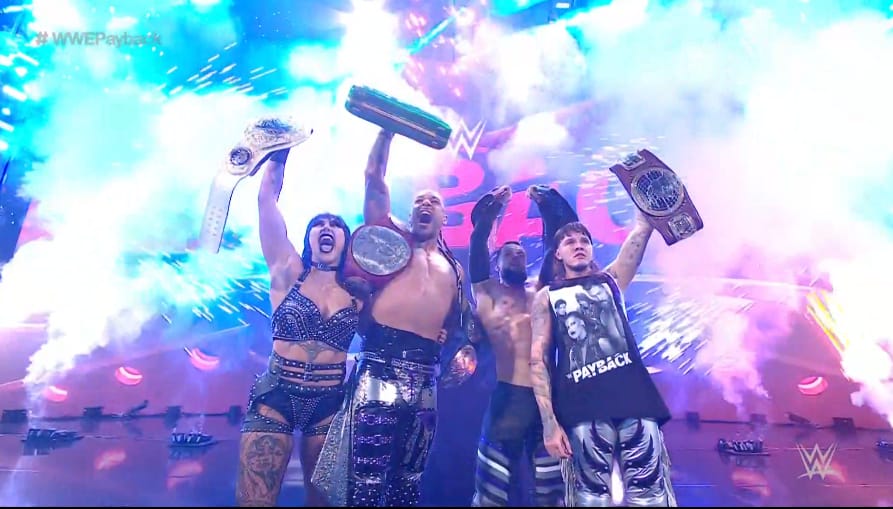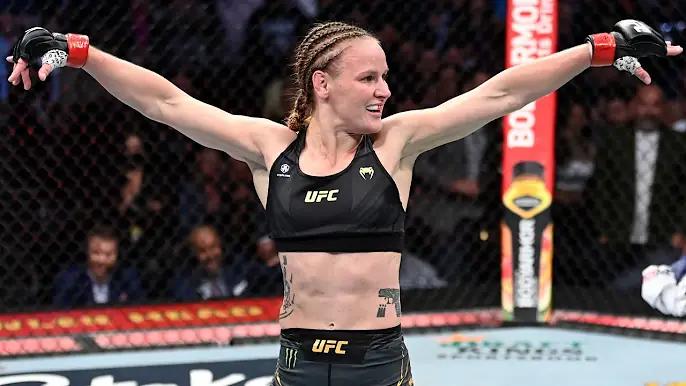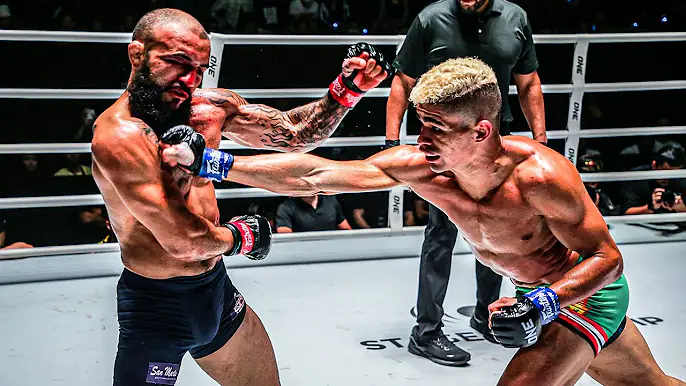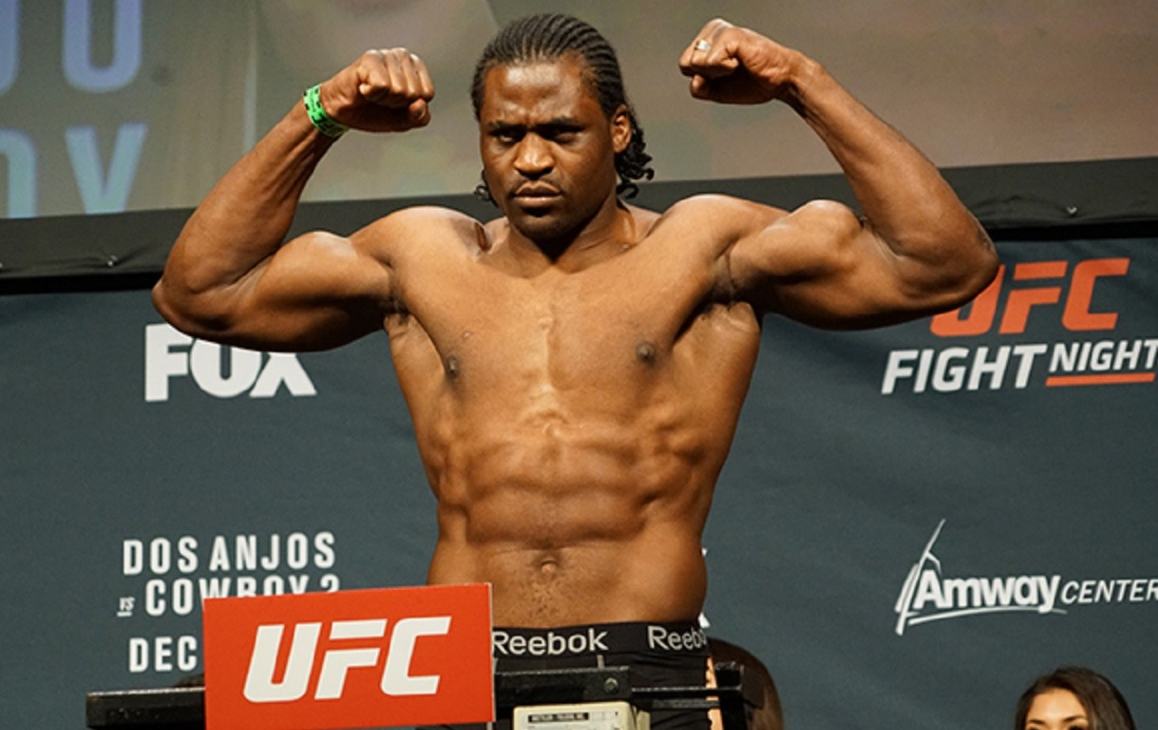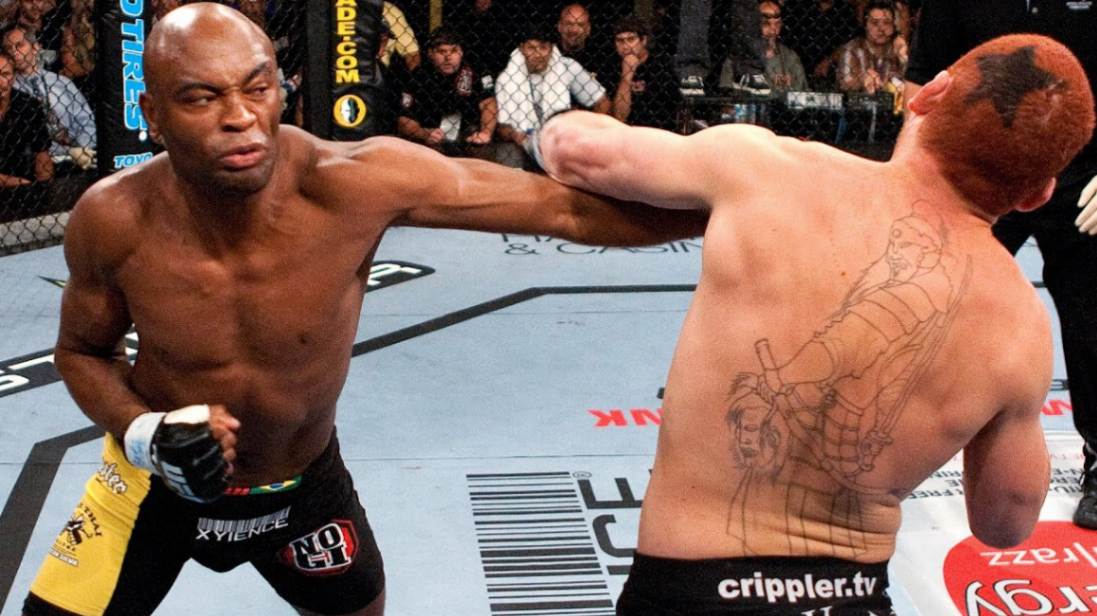The Fighting Philosophy Debate: Jack Della Maddalena Critiques Belal Muhammad’s Approach Ahead Of UFC 315
In the world of mixed martial arts, where spectacle often rivals sport in importance, the clash between entertainment and effectiveness remains a constant point of contention. This debate has been reignited as welterweight title challenger Jack Della Maddalena openly criticized champion Belal Muhammad’s fighting style ahead of their UFC 315 showdown, comparing it to the approach of all-time great Georges St-Pierre. Both fighters, according to the Australian contender, employ what he describes as a “boring” yet undeniably effective methodology that prioritizes victory over virtuoso performances.
The Challenger’s Comments: Breaking Down Della Maddalena’s Critique
Jack Della Maddalena has not minced words when discussing his upcoming opponent Belal Muhammad’s fighting style. During a recent interview with Fox Sports Australia, the Australian challenger made his feelings abundantly clear.
“It’s no question he’s got a boring fight style,” Della Maddalena stated. “He’s good at holding people down and getting victories. GSP got flak back in the day for being a boring style. I definitely think it’s a boring style, but winning is obviously his number one goal, and fair play to him. But I feel like I can beat him.”
These comments have sent ripples through the MMA community, not just for their candor but for the provocative comparison to Georges St-Pierre, widely regarded as one of the greatest fighters in UFC history. By linking Muhammad to GSP, Della Maddalena acknowledges the effectiveness of the champion’s approach while simultaneously critiquing its entertainment value.
Della Maddalena further elaborated on the comparison, explaining that both fighters excel through technical superiority rather than highlight-reel moments. “It’s just because he’s better than people across the board. He can hold down the strikers, he can out-strike the grapplers,” the challenger noted34. This assessment recognizes Muhammad’s well-rounded skill set while framing it as functionally impressive but aesthetically uninspiring.
The timing of these comments is particularly significant as both men prepare for their championship clash at UFC 315, scheduled for May 10 at the Bell Centre in Montreal, Canada. For Della Maddalena, this verbal strategy serves multiple purposes – it places psychological pressure on the champion, frames the narrative of the fight as excitement versus control, and positions himself as the more fan-friendly alternative.
Belal Muhammad’s Fighting Approach: Effectiveness Over Entertainment
To understand the context of Della Maddalena’s criticism, it’s essential to examine Belal Muhammad’s career trajectory and fighting methodology. The current welterweight champion has amassed an impressive 24-3-0 professional record, highlighted by a remarkable 11-fight unbeaten streak in the UFC2. This consistency has carried him to the championship, yet his path has been characterized more by methodical dominance than spectacular finishes.
A closer examination of Muhammad’s statistics reveals a telling pattern – a 79% decision rate in the UFC, accompanied by just 7% submissions and 14% knockouts3. These numbers illustrate a fighter who prioritizes control, positional dominance, and strategic superiority over risk-taking and finish-hunting. While this approach has proven remarkably effective in securing victories, it has simultaneously made Muhammad a target for criticism from fans and fellow fighters seeking more dynamic performances.
Muhammad’s coach, Louis Taylor, has defended his fighter’s approach against such criticisms. “Unfortunately, the MMA community has taken upon making Belal one of the most disliked – or they want to say boring – but Belal’s only boring to people who don’t understand or have a high fight IQ,” Taylor stated in an interview with Parry Punch’s Jacob Castro. This defense frames the perception issue as one of technical appreciation rather than entertainment value, suggesting that true connoisseurs of the sport can recognize the brilliance in Muhammad’s approach.
The champion’s fighting style typically revolves around pressure wrestling, clinch control, and a grinding pace that wears down opponents over five rounds. Muhammad excels at neutralizing his opponents’ strengths while imposing his own game plan, creating fights that showcase technical mastery but often lack the dramatic moments that create viral highlights. This approach has allowed him to overcome more explosive and dynamic opponents through superior conditioning, strategic discipline, and mental fortitude.
Despite the criticism, Muhammad has remained unapologetic about his fighting philosophy. His focus remains firmly on maintaining his championship status rather than adjusting his style to appease critics. In the high-stakes world of UFC championship fighting, this pragmatism has served him well, even if it comes at the cost of mainstream popularity and fan adoration.
The GSP Parallel: Legacy of Dominance and Criticism
Jack Della Maddalena’s comparison of Belal Muhammad to Georges St-Pierre touches on a fascinating parallel in UFC history. GSP, who dominated the welterweight division for years and is widely considered among the greatest mixed martial artists of all time, faced similar criticisms during his championship reign despite his overwhelming success.
St-Pierre’s career evolved significantly over time. Early in his UFC tenure, he was known for more dynamic and finish-oriented performances. However, after suffering a shocking knockout loss to Matt Serra at UFC 69 in 2007, GSP’s approach underwent a transformation. He rebuilt his fighting style around risk minimization, technical perfection, and strategic dominance, resulting in a string of decision victories that secured his legacy while simultaneously drawing criticism for lacking excitement.
Like Muhammad today, GSP prioritized victory and longevity over spectacle. His later career was characterized by methodical game-planning, superior wrestling, and controlling top position – an approach that proved nearly unbeatable but often failed to deliver the dramatic moments fans craved. Despite holding the record for most welterweight title defenses (9) at the time of his retirement, St-Pierre was often criticized for “playing it safe” in championship fights.
St-Pierre himself acknowledged these criticisms during his career. “I agree with the criticism,” he once told The New York Post. “I want to do better. I want to give more entertainment to the fans.” Despite these acknowledgments, GSP never substantially altered his winning formula, understanding that at the championship level, consistency and effectiveness trumped crowd-pleasing risks.
The comparison raises important questions about the nature of combat sports at the highest level. Is a champion’s primary obligation to win at all costs or to entertain? Can a fighter who prioritizes victory over spectacle ever achieve the same level of popularity as more dynamic but potentially less consistent competitors? Muhammad now navigates the same complex terrain that GSP once did, balancing competitive success against fan expectations in an era where entertainment value often drives opportunity.
Despite facing similar criticism, GSP’s legacy ultimately transcended these complaints. His technical mastery, consistency, and longevity eventually overshadowed discussions of his fighting style, securing his place in the pantheon of MMA greats. Whether Muhammad can achieve similar historical redemption remains to be seen, but the GSP comparison provides both a blueprint and a cautionary tale as he navigates his championship reign.
Jack Della Maddalena: The Antithesis in Fighting Philosophy
Standing in stark contrast to Muhammad’s methodical approach is Jack Della Maddalena’s aggressive, finish-oriented fighting style. The Australian challenger brings a perfect 7-0 UFC record to this title fight, part of a remarkable 17-fight winning streak that followed initial career setbacks. This impressive run includes victories over notable opponents like Gilbert Burns and Kevin Holland, establishing Della Maddalena as one of the division’s most dangerous contenders.
Unlike Muhammad, Della Maddalena actively hunts for finishes, employing dynamic striking, pressure, and a willingness to engage in high-risk exchanges. This approach has made him a fan favorite and accelerated his rise through the welterweight rankings. His fighting philosophy embraces the entertainment aspect of combat sports while still delivering results at the highest level of competition.
The Australian’s confidence heading into UFC 315 is evident in his bold public statements. “Eyes on the prize, stoked the UFC has put their trust in me to save the division. This will be done in 1 no doubt,” he posted on Instagram4. This declaration not only predicts victory but suggests a rapid finish – the antithesis of Muhammad’s typically distance-going approach.
Della Maddalena’s path to this title opportunity came unexpectedly. He stepped in as a replacement after original challenger Shavkat Rakhmonov suffered an injury, transforming what was supposed to be a London main event against Leon Edwards into a championship opportunity against Muhammad in Canada1. This twist of fate presents both a monumental challenge and opportunity, as he aims to become just the third Australian to capture UFC gold after Alexander Volkanovski and Robert Whittaker.
In many ways, Della Maddalena represents a different philosophy about what fighting should be at the elite level. While acknowledging the effectiveness of Muhammad’s approach, he clearly values the more dynamic, finish-oriented style that has characterized his own career. This philosophical contrast adds another layer of intrigue to their upcoming championship clash, pitting not just two fighters against each other but two distinct visions of how combat sports should be contested.
The Stylistic Matchup: Grappler vs. Striker at UFC 315
The upcoming welterweight title fight at UFC 315 presents a classic stylistic clash that has defined many of the most intriguing matchups in MMA history. Muhammad, with his wrestling-heavy, control-oriented approach, will face Della Maddalena’s dynamic striking and finishing instincts in a contest that will test both men’s abilities to impose their preferred fighting style.
For the champion, the blueprint likely involves neutralizing Della Maddalena’s striking through clinch work, takedowns, and smothering top control. Muhammad excels at wearing down opponents over five rounds, using his superior conditioning and pressure to break their will and technical execution. His ability to “hold down the strikers,” as Della Maddalena described it, has been the key to many of his victories against striking specialists.
Della Maddalena, however, brings unique challenges that Muhammad must overcome. The Australian has demonstrated impressive takedown defense and the ability to return to his feet even when grounded. In his victory over Gilbert Burns, Della Maddalena was taken down seven times and spent over five minutes under control, yet still prevailed with a finish5. This resilience suggests he may be better equipped to handle Muhammad’s wrestling than some of the champion’s previous opponents.
“I gained valuable experience dealing with that against Gilbert Burns,” Della Maddalena noted. “In that three-round match, I managed to keep returning to my feet and apply pressure. It felt like a classic jiu-jitsu session where I could set him up for a finish later on. With five rounds to work with, I believe this will play to my advantage.”
Contrary to conventional wisdom that suggests championship rounds favor the more control-oriented fighter, Della Maddalena believes the five-round format will work in his favor. “I’m confident I can keep getting up and land significant strikes on Belal. Those extra two rounds will allow me to inflict more damage, and I plan to keep advancing until the final bell.” This perspective suggests the challenger views the longer fight as providing more opportunities for damage and potential finishes rather than more time for Muhammad to implement his grinding approach.
Oddsmakers currently view Della Maddalena as a slight underdog, reflecting both Muhammad’s championship pedigree and the historical advantage that wrestling-oriented fighters often hold over striking specialists. However, the champion’s tendency to go the distance also means he spends more time in potential danger, giving Della Maddalena more opportunities to land the fight-changing strikes he’s known for.
The contrast in fighting philosophies creates fascinating tactical questions. Can Muhammad implement his wrestling game against an opponent with proven defensive skills and get-up ability? Can Della Maddalena keep the fight standing long enough to make his striking advantage count? Will the five-round format favor Muhammad’s conditioning and attrition-based approach, or will it provide Della Maddalena with more opportunities to find a finish? These dynamics make the UFC 315 main event one of the most intriguing stylistic matchups of the year.
The Entertainment Versus Effectiveness Debate in Modern MMA
The criticism of “boring” fighting styles touches on a fundamental tension within mixed martial arts – the balance between competitive effectiveness and entertainment value. This tension shapes fighter development, promotional decisions, fan reception, and ultimately, the evolution of the sport itself.
Throughout MMA history, there has been an ongoing pendulum swing between exciting but defensively vulnerable approaches and more conservative, control-oriented styles that prioritize victory over spectacle. This dynamic reflects the dual nature of MMA as both legitimate sport and entertainment product, creating competing incentive structures for fighters.
The UFC’s reward system illustrates this duality. Championship bonuses, ranking improvements, and title opportunities primarily reward winning, regardless of method. However, performance bonuses, increased popularity (leading to better sponsorships and pay), and promotional backing often follow exciting performances and highlight-reel finishes. Each fighter must navigate these competing incentives according to their own abilities, risk tolerance, and priorities.
Muhammad’s approach clearly prioritizes the sporting aspect of this equation. His fighting style is built around consistent execution, risk management, and strategic dominance rather than creating viral moments or dramatic finishes. This has proven remarkably effective in climbing the divisional ladder and capturing championship gold, but has simultaneously limited his star power and mainstream appeal.
Della Maddalena’s claim that the UFC has “put their trust in me to save the division” speaks volumes about this dynamic. The implication is that Muhammad’s reign, while legitimate from a competitive standpoint, may not be generating the excitement and fan engagement that the promotion desires for one of its marquee divisions. This sentiment reflects the reality that in professional fighting, being the best and being the most popular are not always aligned.
The criticism of “boring” fighters has been a consistent theme throughout UFC history, affecting numerous champions who prioritized control over chaos. Even legendary figures like GSP faced significant backlash during periods where decision victories became their norm. Yet history has shown that sustained excellence eventually transcends such criticisms, with technical mastery and competitive dominance ultimately defining legacies more than momentary entertainment value.
For current fighters like Muhammad, this historical perspective offers both challenges and opportunities. The immediate criticism and potentially slower career advancement must be weighed against the competitive advantages and longevity that a more controlled approach can provide. The path to greatness need not be the most exciting one, but it must be consistently successful at the highest level.
Beyond Fighting: The Personal Element in the Muhammad-Maddalena Clash
The buildup to UFC 315 has featured not just stylistic critiques but personal barbs that have added emotional texture to the championship contest. When Della Maddalena faced financial challenges in bringing his team to the event and started a fundraiser, Muhammad took the opportunity to mock his situation on social media.
“Just when I was gonna donate to your fundraiser so your coaches can come…enjoy Spirit Airlines,” Muhammad posted on social media3. This jab at the challenger’s financial circumstances prompted Della Maddalena to return fire by criticizing the champion’s fighting style, adding a personal dimension to what was already a compelling stylistic clash.
Though the situation was eventually resolved when the UFC agreed to cover travel expenses for Della Maddalena’s team, the exchange highlighted the competitive tension between the two fighters. These personal dynamics often shape fight preparation, in-cage strategy, and the narrative surrounding championship contests, potentially influencing the approach both fighters take on fight night.
Beyond the principals, other voices in the welterweight division have weighed in on the matchup. Former champion Leon Edwards initially leaned toward Della Maddalena before ultimately declaring the fight too close to call: “If I had to put money on it, I’d probably favor JDM. If I had to put money on it. Yeah, if I had to put money on it. I feel like – I don’t know, actually, I don’t know. 50/50. I wouldn’t put any money on none of them. I don’t know.”
Edwards’ ambivalence speaks to the unpredictable nature of this matchup. While Muhammad’s consistent approach has proven effective against numerous opponents, Della Maddalena brings a dangerous finishing ability that could potentially circumvent the champion’s usual path to victory. This uncertainty creates compelling stakes for the welterweight division, with potential implications for future matchmaking and stylistic trends.
Legacy Considerations: What UFC 315’s Outcome Means for Both Fighters
For both Muhammad and Della Maddalena, UFC 315 represents a pivotal moment with significant legacy implications. Each fighter has the opportunity to validate their approach to the sport while advancing their standing in the increasingly competitive welterweight division.
For Muhammad, this first title defense is an opportunity to silence critics and demonstrate that his approach – however it may be perceived – is effective at the highest level. A definitive victory over a dangerous opponent like Della Maddalena would further legitimize his championship reign and potentially begin building the kind of legacy that eventually overshadowed similar criticism of Georges St-Pierre.
The parallels with GSP provide both a blueprint and aspiration for Muhammad. St-Pierre faced similar criticisms during his career but ultimately transcended them through consistent excellence, technical mastery, and an unmatched championship resume. While initially criticized for his methodical approach, GSP is now remembered primarily for his dominance rather than his style. Muhammad has the opportunity to follow a similar trajectory, potentially transforming perceptions through sustained success.
For Della Maddalena, UFC 315 represents the culmination of a remarkable rise through the welterweight ranks and a chance to become just the third Australian UFC champion. Beyond personal achievement, his stated goal of “saving the division” speaks to a desire to bring excitement and dynamism to a weight class that has seen its share of methodical, control-oriented champions.
A victory would not only secure championship gold but potentially validate his more aggressive, finish-oriented approach at the highest level of the sport. This would represent a significant shift in the welterweight division, potentially influencing stylistic trends and matchmaking priorities moving forward. Conversely, a defeat might suggest the limitations of such an approach against elite competition, reinforcing the effectiveness of more conservative methodologies in championship contests.
Beyond the immediate title implications, the outcome will shape both fighters’ career trajectories moving forward. For Muhammad, successfully defending his title would cement his standing among the elite welterweights of his era and potentially set up even higher-profile matchups. For Della Maddalena, capturing the title would thrust him into immediate stardom and open doors to lucrative championship defenses against the division’s other top contenders.
The Future of the Welterweight Division After UFC 315
The outcome of the Muhammad-Della Maddalena clash will have significant ripple effects throughout the welterweight division, potentially reshaping matchmaking priorities, stylistic trends, and promotional focus moving forward. As one of the UFC’s historically prestigious divisions, welterweight has long reflected broader trends within the sport, making championship changes particularly significant.
Should Muhammad retain his title through his trademark methodical approach, it would reinforce the effectiveness of wrestling-heavy, control-oriented styles at the championship level. This could influence developing fighters to prioritize similar skill sets, potentially shifting divisional trends toward more technical, position-focused fighting rather than high-risk, finish-oriented approaches.
Conversely, a Della Maddalena victory – particularly if achieved via the first-round finish he has predicted – could spark renewed emphasis on dynamic striking and finishing ability. Such an outcome might influence the UFC’s matchmaking to favor more aggressive, fan-friendly fighters in title eliminator contests, potentially altering the stylistic landscape of the division’s upper echelon.
Beyond stylistic implications, the result will impact numerous other welterweight contenders waiting in the wings. Shavkat Rakhmonov, whose injury created this opportunity for Della Maddalena, presumably remains next in line regardless of the outcome. However, other contenders like Stephen Thompson, Shavkat Rakhmonov, and even the former champion Leon Edwards will see their paths to title contention shaped by the result of UFC 315’s main event.
The welterweight division has historically been one of the UFC’s most talent-rich and prestigious weight classes, producing legendary champions from Pat Miletich and Matt Hughes to Georges St-Pierre and Kamaru Usman. Whether Muhammad joins this pantheon through sustained dominance or Della Maddalena disrupts the established order with a more explosive approach remains to be seen, but the implications will extend far beyond a single night in Montreal.
Conclusion: Stylistic Clash Embodies MMA’s Essential Tensions
As Jack Della Maddalena and Belal Muhammad prepare to clash at UFC 315, their contest represents more than just a championship fight – it embodies the essential tension between entertainment and effectiveness that has defined mixed martial arts since its inception. Della Maddalena’s criticism of Muhammad’s “boring” style, particularly its comparison to GSP’s approach, highlights this ongoing debate about what makes a truly great fighter.
Muhammad’s methodical, control-oriented approach has carried him to championship gold through consistent execution and strategic dominance. Like Georges St-Pierre before him, he has prioritized victory and technical mastery over spectacle, creating a resume built on excellence rather than excitement. This path has proven effective in competitive terms while simultaneously generating criticism from those who value entertainment alongside athletic achievement.
Della Maddalena represents the counterpoint to this philosophy – a dynamic finisher who actively seeks spectacular victories rather than methodical ones. His rise through the welterweight division has been characterized by aggressive performances and highlight-reel moments, making him a fan favorite despite his relatively brief UFC tenure. His challenge of Muhammad offers not just a clash of fighting styles but of fundamental philosophies about what combat sports should prioritize.
When these two welterweights meet in Montreal, the outcome will influence not just their individual careers but potentially broader trends within the sport. Whether Muhammad’s control-oriented approach or Della Maddalena’s dynamic striking proves superior on May 10, the result will add another data point to MMA’s ongoing debate about the balance between winning and entertaining at the highest level.
In a sport that constantly evolves through the emergence of new techniques, strategies, and approaches, this clash of styles represents MMA’s essential character – a continuous negotiation between effectiveness and entertainment, between sporting legitimacy and spectacular moments that capture the imagination.
